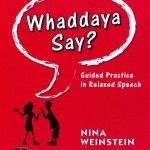Reduced forms
Image from here
I think the list of reduced forms from Karen Bond is an example of the transition between the greenhouse and the garden. And at least in British English, the majority of them would also have (many) jungle forms, in which consonants would have close to zero realisation.
So a lot of the syllable final consonants in the multi-word, multi-syllable groups would be dropped (or would sound like as if they are dropped). There may be an articulation, but there may be no audible release. Thus ‘might have’ in the jungle can (for me) be ‘my a’ (Maia) in ‘I might have (my a) gone with him’. Remember we are talking about rapid casual speech! Not slow careful speech. So it is helpful to think of ‘might have’ as being non-prominent, between prominences on ‘I’ and ‘GONE’:
|| I might have GONE with him ||
Also, in my view, for deep in the jungle, there is no need for separate rules with the structure ‘x plus consonant’ or ‘x plus vowel’. Thus (in Karen’s garden) ‘would have + consonant’ becomes ‘woulda’ and ‘would have’ + vowel becomes ‘wouldav’ – BUT in the jungle, both could be ‘woulda’: giving ‘I woulda done the dishes’ and ‘I woulda asked you’.
But, remember, the jungle is very unruly, so it is not helpful to think of my examples of what could happen (and what does happen) as ‘rules’. There are very many intermediate forms.
Other Greenhouse/Garden/Jungle sequences:
kind of/kinda/kynuv (or even ‘kye-uv’)
did you/didja/diya



Leave a Reply